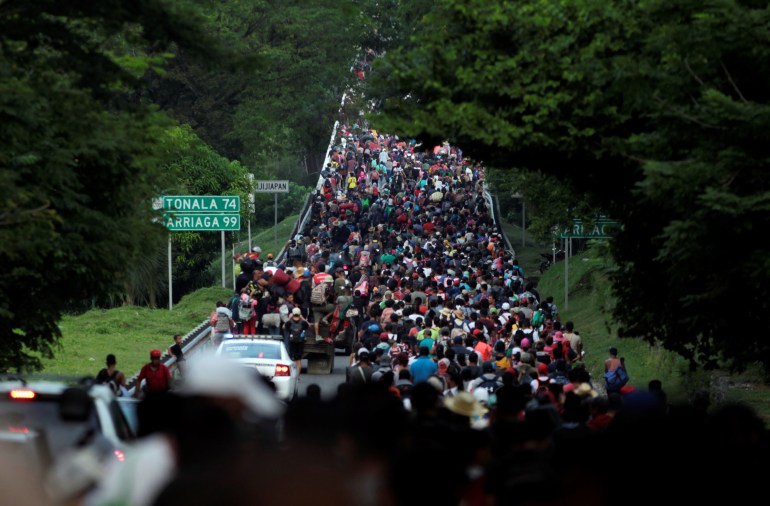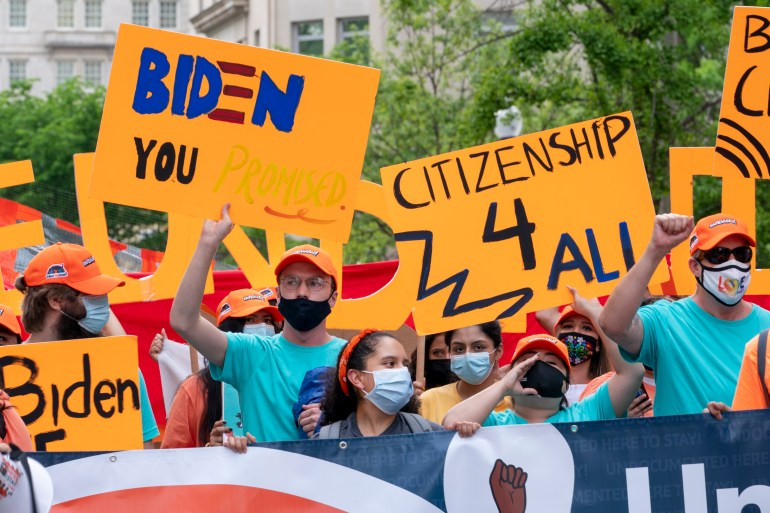US advocates say ‘Congress needs to act’ amid migrant arrivals
Immigration advocates say US needs legislation to effectively respond to arrivals at border, but divisions run deep.

Washington, DC – A few thousand migrants, most of them fleeing poverty and violence in Central America and the Caribbean, set out from southern Mexico last month in hopes of reaching the United States.
There is a strong possibility that Mexican authorities will block the group – which is travelling on foot – from coming close to the US-Mexico border, as per the terms of a deal between the two countries to stem irregular migration to the US.
Keep reading
list of 3 itemsUS Democrats’ bid to reform immigration laws blocked in Senate
Biden administration faces ‘critical moment’ on migration
But if the migrants do make it to the border, the US is likely to expel most of them under Title 42, a Trump-era policy that allows for immediate removals and that US rights groups, progressive leaders and the United Nations have blasted as a violation of international law.
President Joe Biden has kept the measure in place despite the criticism, as his administration struggles to respond to a 20-year high in the number of migrants and asylum seekers arriving at the US southern border.
It is not the first time the nation has faced challenges at the border, and it is unlikely to be the last, as immigration advocates say crises in Central and South American nations will continue to push thousands to seek protection in the US.
Those advocates now are calling on US legislators, bitterly divided along partisan lines on the issue, to pass legislation in Congress to reform the country’s immigration system, arguing that is the only way to respond in an effective and humanitarian manner.
“Immigration in this country is about politics, not about policy,” said Melanie Nezer, senior vice president for public affairs at HIAS, a US refugee resettlement agency. “It’s an intensely politicised issue, making it almost impossible to make good policy.
“The laws need to change,” she told Al Jazeera. “Congress needs to act; anything that the president does is temporary without Congress,” adding that Congress has to be a partner in the goal of protecting people in need.

Landmark bill
Immigration advocates say the last time Congress enacted sweeping changes to the US immigration system was in 1986 under former President Ronald Reagan.
The Immigration Reform and Control Act, which was hailed as a landmark immigration bill, made it a criminal offence for employers to hire undocumented migrants and offered legal status to nearly three million undocumented migrants who had been in the US prior to 1982.
The bill also included critical changes to policing at the US southern border, increasing funding for additional security technology and beefing up the number of border patrol agents. The measures, legislators argued at the time, would deter people from crossing without permits.
“It was the first time in recent history that the US embraced the notion that if we employ military force on our border we would dissuade people from even trying to cross the US border,” said Oscar Chacon, co-founder and executive director of Alianza Americas, a network of Latin American and Caribbean immigrant organisations.
“Clearly, that has not worked because it completely ignores why people are fleeing and because of that, it has been an outright failure and a terrible waste of public resources,” Chacon told Al Jazeera.
This fiscal year, US authorities detained 1.7 million migrants trying to cross the border – an all-time high – while the population of undocumented migrants living in the US has swelled to an estimated 11 million people.

Trump’s lasting legacy
Absent action by Congress, successive US administrations have enacted immigration policy through executive orders and Department of Homeland Security memos. Most of the measures, experts say, have been focused on increased policing.
The lack of action by Congress proved critical when former President Donald Trump, a Republican who made restricting immigration to the US one of his top goals, took office.
Starting in 2016, Trump signed executive orders that banned the entry of citizens of several Muslim-majority countries into the US, forced asylum seekers to wait in Mexico for their US immigration hearings, and increased deportations of undocumented migrants, among other measures. He also made building a wall with Mexico a hallmark of his immigration policies.
Amid continued gridlock on immigration in Congress, Biden reversed several of Trump’s policies by issuing his own executive orders after taking office in January.
But Trump’s hardline position on immigration has become entrenched in the Republican Party, political analysts say – and with Congress currently evenly divided between Republicans and Democrats, the prospect of passing meaningful immigration reform appears slim.
Experts say the last time Congress voted on comprehensive immigration reform legislation was in 2013 when the Senate passed a bill backed by former President Barack Obama with 68 votes in favour – including 14 Republicans – and 32 against. House Republicans refused to consider the bill, however, which would have made it possible for many undocumented immigrants to get on a path to citizenship.
Senate Republicans since then have increasingly opposed Democratic efforts at passing revisions to US immigration laws.

Recent surveys also show Americans are split along party lines when it comes to immigration. Seventy-five percent of Democrats compared with 41 percent of Republicans said they support admitting Central Americans fleeing violence and poverty into the US, an NPR/Ipsos poll released in September found.
“You can’t have the leader of one party turn immigration restriction or immigration expansion into their primary issue, without there being a partisan backlash against it by the other party,” said David Bier, an immigration policy analyst at the libertarian Cato Institute.
“It [immigration] was a big focus of his [Trump’s] campaign and while in office, he just applied his anti-immigrant agenda everywhere,” Bier told Al Jazeera.
Push for action
Ongoing efforts by members of Biden’s Democratic Party to include a pathway to citizenship for the majority of the 11 million undocumented immigrants living in the US as part of an ambitious $1.85-trillion, 10-year spending plan, have stalled due to Republican opposition. The proposal is unlikely to survive Senate rules that govern budget measures.
Instead, the bill is expected to include $100bn in funding for reducing “backlogs, expand legal representation, and make the asylum system and border processing more efficient and humane”, according to the White House.

Immigrant advocates say this is not enough, however.
They want Democrats in Congress to push for legislation that would, in addition to legalising undocumented migrants, grant pathways to citizenship to DACA recipients – migrants who were brought to the US as children – as well as for Temporary Protection Status holders and farmworkers.
They have also called on the US to reinstate its asylum system, which they argue is not functioning due to restrictive policies at the border, such as Title 42. Advocates say their demands are long overdue and would fulfil promises that the Biden administration campaigned on.
“Let’s make this clear. Democrats in Congress have not delivered on their promises to the immigrant community in decades!” RAICES, a pro-immigration, Texas non-profit, wrote on Twitter on Friday.
Meanwhile, amid overall declining approval ratings for Biden, 68 percent of Americans said they disapprove of his handling of immigration and the situation along the US-Mexico border, according to an ABC News/Ipsos poll published on October 31.
“There are people on the move worldwide, fleeing economic and global climate crises and our asylum system is not functioning in the way that it was intended to because the world has changed in the last 35 years,” said Nicole Melaku, executive director of the National Partnership for New Americans, an immigrant advocacy organisation.
She told Al Jazeera the US should consider passing legislation that would address current migration flows, such as designating new categories of migrants and asylum seekers to include climate refugees and people fleeing economic collapse.
“The world is changing right before our eyes and we don’t have the mechanism to address that change in real time,” Melaku said.
Let's make this clear. Democrats in Congress have not delivered on their promises to the immigrant community in decades! It's time they #KeepThePromise and pass the #BuildBackBetterAct today with protections that the undocumented community deserves.
— RAICES (@RAICESTEXAS) November 5, 2021